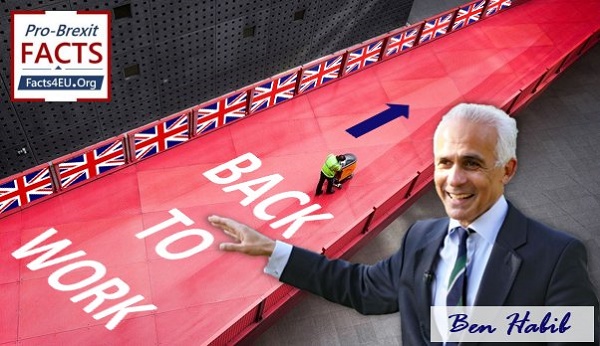“The Prime Minister’s Covid-19 Dunkirk?”
Opinion piece by former Brexit Party MEP Ben Habib for Brexit Facts4EU

© Brexit Facts4EU.Org 2020
Ben Habib was MEP for London for the Brexit Party until 31 Jan 2020. He is Chairman of Brexit Watch and CEO of First Property Group Plc
“The Prime Minister’s Covid-19 Dunkirk?”
By Ben Habib

© Australian War Memorial
If World War 2 is a suitable analogy for the Covid-19 pandemic engulfing the UK, the Prime Minister’s announcement on 10 May perhaps represented the retreat of our troops towards Dunkirk. Hitherto, the war fought against the virus has had all the hallmarks of the opening phases of the last World War.
The UK was caught off guard and unprepared. It has thus far waged a somewhat confused and incoherent battle. The lack of preparedness can perhaps be forgiven; the pandemic emerged with little warning and spread rapidly. But, once the war started, it could and should have been fought quite differently.
A different approach was needed
First and foremost the government should have taken the virus seriously. It plainly did not or else it would have set about procuring medical equipment and test kits. It would have immediately taken steps at least to monitor the health of people flying into the UK (most notably from China and Italy). And most importantly it would have taken steps to protect the vulnerable and elderly.

There was much less known about the virus in the opening salvos but what was pretty clear was that it effected the elderly and people with pre-existing medical conditions much more so than anyone else. Instead of instantly moving to protect care homes, the elderly were in fact discharged from hospital, without being tested, into care homes to make bed space available; thereby taking the virus to the heart of those most vulnerable. Official death statistics now evidence this grim fact with 87% of UK deaths being of people over the age 65 years.
Imperial College’s modelling panic
Then there was the infamous Imperial College report forecasting that over 500,000 people would die of the virus if left unchecked. That panicked the government into extreme action locking down the country at vast cost in both human and economic terms. To achieve compliance with the lockdown the government put the fear of God into the populace. This fear runs deep across the country and is bound to make it extremely difficult for the government to reverse lockdown.

© Imperial College London - Centre for epidemiological analysis and modelling of infectious diseases
But still the government failed to take adequate steps to control flights into the UK. Still it claimed that testing, tracking and tracing the virus was not a sensible course of action. Still the elderly were not adequately protected.
Notwithstanding the large number of deaths in the UK the lockdown had the desired effect of reducing the number of infections and freeing up significant capacity at the NHS. The NHS now also has much larger supplies of personal protective equipment.
Loosening the lockdown?
So, when we were told that the Prime Minister would be announcing measures for a loosening of the lockdown on 10 May, many hoped and prayed that now, armed with empirical evidence and surplus capacity in the NHS, the government would take concrete steps to protect the vulnerable and elderly and otherwise open the economy to the fullest extent possible, albeit with in-built social distancing measures.
Too little, too late
We were sadly disappointed. It seems that the sense of panic which prompted the lockdown persists. The only parts of the economy due to be immediately “opened” are those involved in food production, construction, manufacturing, logistics, distribution and scientific research. Most of these were, in any event, operating during the lockdown. Crucially, even though the UK is a consumer led economy, it was made clear that “non-essential” parts of the economy would remain closed until at least July. By then the UK’s lockdown would have been in place for almost a quarter of a year. The cost of this lockdown was always going to be vast but it is now going to be much greater than need have been the case.

Evidencing recognition of its initially flawed response, the government it is now at last seeking to test, track and trace. It is also going to quarantine travellers to the UK for a period of 14 days. For a pessimist, gates, horses and bolted might come to mind but we should be delighted they are now taking these measures.
This is not a war
We must, however, be very concerned by the government’s mission creep. When the lockdown was instituted the Prime Minister made it clear that the aim was to squash the peak of the virus. Stay home, protect the NHS and save lives was the slogan. The (correct) implication of this was that, once the peak was squashed, the UK would get back to business.
For some reason, the aim now, as expressed by both the Prime Minister and Leader of the Opposition over the last two days, is to defeat the virus. The reality is that this is not a war. Absent a vaccine the virus cannot be defeated. We must learn to live with it. Therein lies the rub. How could we possibly live with it given the deep fear we have of it?
We must get back to work
A key component is government messaging. It has to change. Instead of using military metaphors and cowing the populace into compliance the government needs to be frank. It needs to make it abundantly clear that this is a virus which cannot be defeated. But that its effects need not be as pernicious as feared. It very largely only kills those with pre-existing medical conditions and the elderly. The government must set out effective measures to protect these people. And for the rest of us, it must institute regulations for suitable social distancing measures within the workplace, retail and leisure settings – and get us back to work!
Government messaging must be frank, clear and purposeful. Military metaphors, as helpful as they are in the art of politics, are deeply unhelpful in the context of the virus. The word “defeat” must be banished. Equally, suggesting people “Stay Alert” adds nothing to anyone’s understanding of the virus or how it should be handled. The virus is not a terrorist threat.
Only with an honest and frank assessment of the risks of the virus alongside balanced and sensible protective measures will the government be able to carry the nation with it and safely unlock the country. It urgently needs to do so.
Mr Habib writes here in his personal capacity
Observations
As regular readers know, from time to time we invite politicians and commentators to write articles for us. We are grateful to Ben Habib for this contribution to the debate on the Covid-19 lockdown.
Mr Habib is Chief Executive of First Property Group plc, a commercial property investment and fund management company. In May 2019 he stood as a candidate for the Brexit Party in the London constituency of the EU Parliamentary elections, which he won comfortably. He served until the technical departure of the UK from the EU on 31 January 2020. In the past Mr Habib had been a Conservative Party supporter and donor.
At the EU Parliament he was a member of the Committee on Economic and Monetary Affairs.
The Company which Ben Habib founded, First Property Group Plc, is active in the United Kingdom, as well as in two EU countries: Poland and Romania.
[ Sources: Ben Habib | First Property Group Plc ] Politicians and journalists can contact us for details, as ever.
Brexit Facts4EU.Org, Wed 13 May 2020
Click here to go to our news headlines
And please scroll down to COMMENT on the above article.
Since before the EU Referendum, Brexit Facts4EU.Org
has been the most prolific researcher and publisher of Brexit facts in the world.
Supported by MPs, MEPs, & other groups, our work has impact.
We think facts matter. Please donate today, so that we can continue to ensure a clean Brexit is finally delivered.
Paypal Users Only - Choose amount first
Quick One-off
Monthly


Something to say about this? Scroll down for reader comments